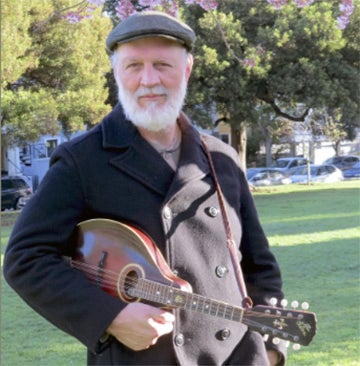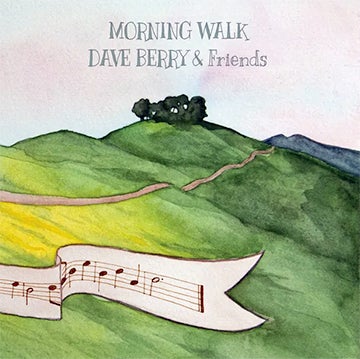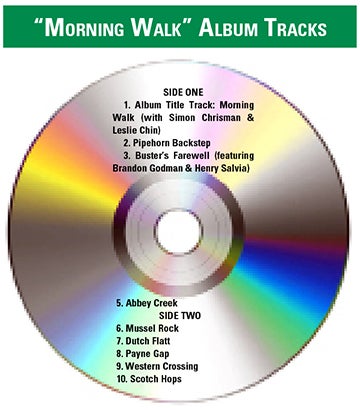Berry goes from natural grass to Bluegrass
Published 9:31 pm Wednesday, July 6, 2022
By Jim Walker
jim.walker@irontontribune.com
SAN FRANCISCO — Dave Berry went from first string to four strings and it has been string music each time.
As a player for Ironton High School, Berry was a first string lineman on a team that made the program’s first trip to the state finals when the Fighting Tigers fell to Cleveland Benedictine in the Class AA title game.
In fact, Berry was a two-way starter, much like two pairs of four strings on a mandolin.
After graduating from Ironton in 1974, life took over as he made a living in computer software and wound up living in San Francisco. Even before he retired, Berry became involved with four strings 22 years earlier.

Ironton native and former football standout Dave Berry is making a career in Bluegrass music while living in San Francisco. (Photo Submitted)
At the age of 40, Berry took up playing the mandolin, an instrument that has four pairs of strings for a total of eight. He had a love of various genres of music, but his hometown roots led him to playing Bluegrass. In fact, the history of football in Ironton dating back to the semi-pro Ironton Tanks inspired the song “Men of Iron and Steel.”
“Men of Iron and Steel is a song that I wrote after reading about the dedication of a football stadium that was built in the 1920s in my hometown of Ironton. Tanks Memorial Stadium is still used today by the Ironton Fighting Tigers High School football team. The song was used during the (Portsmouth) Spartan Stadium dedication ceremony.”
A software engineer and manager, Berry “retired” at the age of 62 and then COVID hit and he was inspired to record by a friend he knew who was recording some of their own original material. Berry had a plethora of tunes he had written and decided he might as well take the plunge and do his own recordings.
“It just kind of took off from there,” said Berry.
The most recent composition “Morning Walk” is the title of Berry’s latest album. The song also features Simon Chrisman and Leslie Chin and it’s a reflection on the days when his two sons Jacob and Samuel were still living at home with dad and mom Mary Ann.
“Since our oldest son was 12 years old, we’d get up every morning and walk up our little hill in San Francisco and see wild life up there and it has just become our daily constitution. And I’d come home write tunes and it would just seem like a morning walk and then it just kind of blossomed, said Berry.
“A neighbor made the album cover — a beautiful painting of the hill — and then another neighbor did the video and he got his daughter to be up there and he did two or three shoots in the video and even the mix engineer is from the neighborhood. It’s really just a local, hometown thing for our neighborhood.”
Berry said the album was a result of “gumption,” or just good old-fashioned persistence which is something he learned while growing up in Ironton. He said anyone who grew up in the town knew what was meant when they heard the word.
“Gumption. It’s going the extra mile and just doing it. I’m able to take a long view of these things and keep hammering away at it. Eventually, you get finished,” said Berry.
“There are 29 other people on that (album). There were a few people who were on three or four tracks. It goes back to gumption. I would try one person and see they couldn’t do it and I’d try somebody else and I’d often end up with a better fit. So, things just have a way of working their way out if you keep at it.”
The recording process was done remotely so Berry revealed that he had never been in a recording studio.
“I would put together the melody as well as I could and use a rhythm track, and then I would send it to friends and see if they wanted to put down a violin or a banjo or guitar or whatever and then they would send me back my stuff,” said Berry.
“We just put it into the computer software and start to make a mix of it. That’s how it came about. People just sending me files over the internet. There was no collaboration in terms of us playing together as in a Zoom or anything You can’t really do that.”
Berry’s journey from playing football at Ironton to recording albums in San Francisco has had many twists and turns and he said the music end of it actually began in high school when he started singing during the period that featured artists such as Pure Prairie League and the Byrds.
“Dad (Bob Berry) was a singer and dad also did the hambone (percussion with the body) and he was a big whistler,” said Berry. “He would never say he had musical talent. My mom is from down in Jenkins, Ky., and music is as thick as the hills down there.”
From Ironton, Berry lived in New York and it was there when he began is first experience with a musical instrument.
“I picked up the guitar when I was about 20. In New York, I was playing with a bunch of people around town. I didn’t play as much up in New York. To be honest, when we had kids I picked it back up because we started listening to those Raffi records,” said Berry referring to the music of the famed children songs performer Raffi Cavoukian.
“This is a very common story. People say this all the time. Raffi music reinvigorates people’s interest in music because their kids hear it and they’re singing “This land is your land” and all those tunes and I said, ‘Heck, I can play three chords.’ So, that kind of got me back into it.
“We go to festivals (in California) and we went with some friends that our kids went to school with and the dad played mandolin and the son played mandolin, so I said, ‘Gosh, I could probably do that.’ So, I bought a mandolin and it kind of took off. It was only a hundred dollar instrument.”
Not only does Berry walk the walk, he can talk the talk. In other words, he not only composes and plays the song but he writes about it as well. He has written stories for Bluegrass Today, the California Bluegrass Association (CBA), Porch Talk and Welcome columns.
His writings have led him to interview such Bluegrass legends as Grammy winning composer, instructor and mandolinist John Reischman, Steve Gilchrist who is considered one of the finest mandolin makers in modern history of the instrument which Berry owns and plays, Kathy Kallick who has won not only a Grammy but two International Bluegrass Music Award (IBMA) Awards and is a recipient of a Lifetime Membership from the California Bluegrass Association, nine-time Northern California Bluegrass Society Female Vocalist of the Year A.J. Lee who is a mandolinist and the lead of the Blue Summit band, Tom Rozum who is a California Bluegrass Association lifetime member and right-hand man to Laurie Lewis, Ohio native Jerry Douglass who has won 14 Grammy Awards and has played on 1,600 albums with such artists as Garth Brooks, Ray Charles, Eric Clapton, Phish and Dolly Parton among others, and Sierra Hull from Hardly Strictly Bluegrass who is a multiple IBMA award-winner and has played the Grand Ole Opry, Carnegie Hall along with the White House — all before turning 20.
Berry has found that his writing experience helps in his recording jobs as mixing, i.e. Morning Walk.
“I meet a lot of people because I’ve been doing these interviews and I’m active in this organization, I’ve been going to jams forever, and I just had a lot of friends who I could reach out to. One of the great things is it crosses age boundaries. There are some 20-year olds who play on this. It’s really quite nice. In some ways, it’s no different than sports. You go to a track meet you see all age groups there. In that regard, it’s no different,” said Berry.
“To be fair, you can hide a lot of stuff when you’re behind a computer. You have a chance to do a lot of takes and early on I felt like that was cheating. Where we come from, I feel like I’m cheating. But then I realized it’s a tool. In studios, they use all the tools they can to get the music out of there as quick as possible because that’s time and money. And, it’s just a tool. Only the best musicians like Del McCoury (Band). Those bands can just go in and do the one take. Of course, that’s top shelf stuff.”
Berry said the music business has changed throughout his life from vinyl records to cassette tapes to CDs and now downloads on the internet.
“For someone like me who’s just a regional player, you pretty much only sell at your shows or to your friends. So, it has limits. It’s not like it used to be when it was the only game in town. Now, you put things up on Apple or Spotify. Apple had a big release last year when they made a big deal that we play a penny a stream. So, whoopee. Get a thousand streams, I get 10 dollars. But if I go play a local cafe and sell a couple CDs, then I make. 20 or 30 dollars. It’s a crazy world and I’m glad I don’t have to depend on any of this for income.”
Berry said in the local music business it’s the mix and master engineers who make the money which has led him to produce his own material with his own label.
“I have my own label, but I’m not making any more money off of it. I have to pay the mix engineer and the master engineer if I want a professional sound,” sad Berry.
With that in mind, Berry decided he wanted the project to be the best it could be and if somebody hears it and wants to put it in a film or on NPR, then they’re going to listen to it and think that’s really professional sounding.
“You’ve got to pay to get professional people to do it. But that wasn’t the biggest expense. I always try to pay the artists, but a lot of them refused payment because they are friends. You can’t just expect everyone to give you their time for nothing.”
Another quirk with Bluegrass music is the fact a lot of albums like Berry’s are mostly instrumentals. Berry said that many songs typically have words and tunes do not and are named after places and he is no different than other artists when naming a song.
“I named one song Paint Gap after where my mother (Jean) was from in Jenkins, Ky., and another was named Buffalo Creek which was dedicated to the infamous 1972 flood in a nearby West Virginia community,” he said.
And judging by the path Berry has taken and all the learning experiences he has helped him grow in the Bluegrass business, there’s one word that best describes him.
Gumption.
(NOTE: For more information about Berry and his music, visit online daveberrymusic.net)



